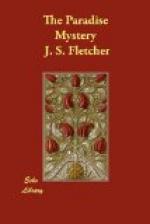“Varner may be as certain of it as he likes,” answered Archdale, almost indifferently, “and still he may be mistaken. The probability is that Varner was confused by what he saw. He may have had a white shirt cuff and the sleeve of a black coat impressed upon him, as in a flash—and they were probably those of the man who was killed. If, as I suggest, the man slipped, and was shot out of that open doorway, he would execute some violent and curious movements in the effort to save himself in which his arms would play an important part. For one thing, he would certainly throw out an arm—to clutch at anything. That’s what Varner most probably saw. There’s no evidence whatever that the man was flung down.”
Bryce turned away from the group of talkers to think over Archdale’s suggestion. If that suggestion had a basis of fact, it destroyed his own theory that Ransford was responsible for the stranger’s death. In that case, what was the reason of Ransford’s unmistakable agitation on leaving the west porch, and of his attack—equally unmistakable—of nerves in the surgery? But what Archdale had said made him inquisitive, and after he had treated himself—in celebration of his freedom—to an unusually good lunch at the Club, he went round to the Cathedral to make a personal inspection of the gallery in the clerestory.
There was a stairway to that gallery in the corner of the south transept, and Bryce made straight for it—only to find a policeman there, who pointed to a placard on the turret door. “Closed, doctor—by order of the Dean and Chapter,” he announced. “Till further orders. The fact was, sir,” he went on confidentially, “after the news got out, so many people came crowding in here and up to that gallery that the Dean ordered all the entrances to be shut up at once—nobody’s been allowed up since noon.”
“I suppose you haven’t heard anything of any strange person being seen lurking about up there this morning?” asked Bryce.
“No, sir. But I’ve had a bit of a talk with some of the vergers,” replied the policeman, “and they say it’s a most extraordinary thing that none of them ever saw this strange gentleman go up there, nor even heard any scuffle. They say—the vergers—that they were all about at the time, getting ready for the morning service, and they neither saw nor heard. Odd, sir, ain’t it?”
“The whole thing’s odd,” agreed Bryce, and left the Cathedral. He walked round to the wicket gate which admitted to that side of Paradise—to find another policeman posted there. “What! —is this closed, too?” he asked.
“And time, sir,” said the man. “They’d ha’ broken down all the shrubs in the place if orders hadn’t been given! They were mad to see where the gentleman fell—came in crowds at dinnertime.”
Bryce nodded, and was turning away, when Dick Bewery came round a corner from the Deanery Walk, evidently keenly excited. With him was a girl of about his own age—a certain characterful young lady whom Bryce knew as Betty Campany, daughter of the librarian to the Dean and Chapter and therefore custodian of one of the most famous cathedral libraries in the country. She, too, was apparently brimming with excitement, and her pretty and vivacious face puckered itself into a frown as the policeman smiled and shook his head.




